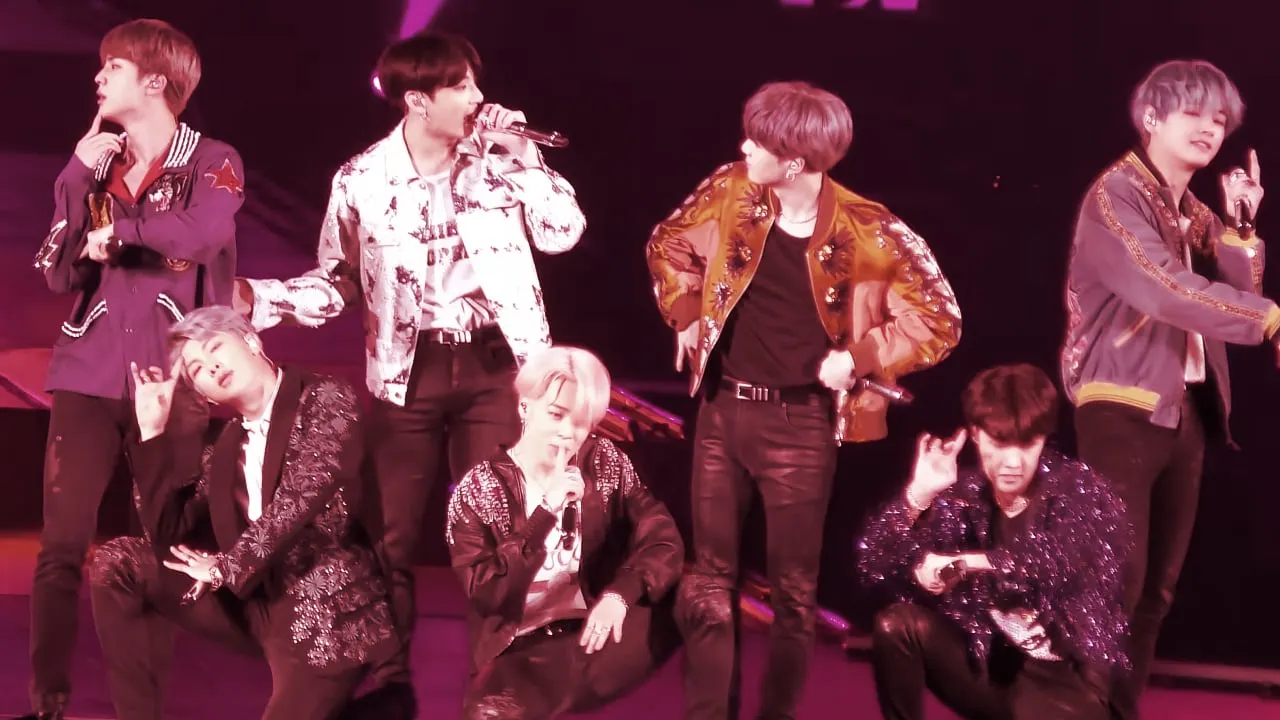The management agency behind South Korean boy band BTS is pressing ahead with plans to produce non-fungible tokens (NFTs), despite sharp criticism from the K-pop act’s millions of supporters.
After entertainment giant Hybe announced plans to launch a range of NFTs based on its roster of artists earlier this year, fans of BTS took to Twitter to protest at the environmental impact of NFTs.
However, on Thursday, Hybe confirmed in a statement —the first time it has responded publicly to the backlash—that its NFT plans will go ahead.
"We believe NFTs have the potential for expansion and hope they will provide fans with more varied experiences and opportunities to express themselves,” John Kim, project lead, HybeAmerica, told the Wall Street Journal.
He added that an initial launch of NFT photo cards of BTS, who are among the music industry’s most profitable artists, will happen in less than six months.
Highly coveted images
Physical images of BTS band members are highly coveted, with some fetching thousands of dollars online. BTS figurines, prints, and other merchandise are a huge profit maker for Hybe, which generated over $200 million in merchandise and licensing sales in 2021.
Plans for BTS NFTs were first revealed in November, when Hybe announced a partnership with top Korean crypto exchange Dunamu. But the move hit a sour note with BTS fans, who rallied around hashtags such as #BoycottHybeNFT and #ARMYsAgainstNFT in protest at the energy consumption required to mint the unique digital assets.
They argue that the move runs counter to the band’s climate activism, including a 2018 appearance by BTS at the United Nations General Assembly.
Climate capital
For its part, Dunamu’s NFT business development and strategy manager Kim Min-jung, told the Wall Street Journal that the platform would have a limited impact on the environment. “Its carbon footprint is almost negligible,” he said.
Hybe has not yet revealed which blockchain will be used to host the NFTs. The most popular blockchain for minting NFTs is Ethereum, which currently uses the energy-intensive proof of work consensus mechanism. But a growing number of NFTs are moving to blockchains that employ the alternative proof of stake consensus mechanism, which—per a 2021 UCL study—uses orders of magnitude less energy. Ethereum itself is set to join them, switching to proof-of-stake with its upcoming Ethereum 2.0 upgrade.
But efforts by entertainment brands to launch NFTs have faced widespread pushback from consumers. In September, Legendary Pictures faced a fan backlash for launching a range of NFTs based on the film “Dune”, with many critics flagging up the fact that the original book is an environmental allegory. Earlier this month, video game publisher GSC Game World abandoned plans to include NFTs in its game S.T.A.L.K.E.R. 2: Heart of Chernobyl, after a furious reaction from gamers.
The fact that introducing NFT versions of physical images is an effective way to stamp out counterfeiting, and has potential to boost their coffers will not have escaped Hybe, however. Indeed, BTS are not the first musicians to enter the red-hot NFT space, a market which analytics platform DappRadar estimated will end with $22 billion year-to-date sales.
Eager to tap into new revenue streams and better connect with their fanbase, musicians including Timbaland, Snoop Dogg, Grimes, 3LAU, and Kings of Leon have all experimented with the technology. But winning music fans over to NFTs may prove more of a challenge than anticipated.
Daily Debrief Newsletter
Start every day with the top news stories right now, plus original features, a podcast, videos and more.

